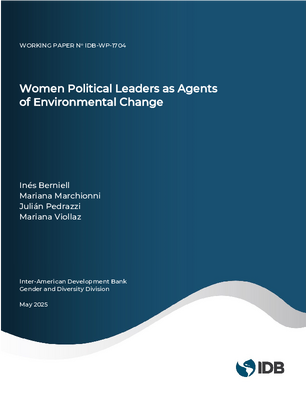Women Political Leaders as Agents of Environmental Change
Date issued
May 2025
Subject
Gender;
Municipal Government;
Climate Change;
Women;
Elections;
Political Participation;
Environmental Assessment;
Greenhouse Gas Emission;
Land Use
JEL code
J16 - Economics of Gender • Non-labor Discrimination;
D72 - Political Processes: Rent-Seeking, Lobbying, Elections, Legislatures, and Voting Behavior;
Q54 - Climate • Natural Disasters and Their Management • Global Warming;
Q56 - Environment and Development • Environment and Trade • Sustainability • Environmental Accounts and Accounting • Environmental Equity • Population Growth;
Q58 - Government Policy
Country
Brazil
Category
Working Papers
This paper explores how female political leaders impact environmental outcomes and climate change policy actions using data from mixed-gender mayoral races in Brazil. We rely on a Regression Discontinuity design that compares municipalities where women narrowly won the election with those where men narrowly won. This strategy allows us to identify the causal effect of a woman winning the mayoral election. We find that, compared to male mayors, female mayors significantly reduce greenhouse gas emissions and deforestation in the municipalities with Amazon biome. Specifically, when a woman wins the election, annual greenhouse gas emissions decrease by 1,510 thousand tons of CO2e per municipality in the Amazon. This effect alone represents 23% of the average annual emissions of all municipalities within the Amazon biome and 6.4% of Brazil's nationwide average. This reduction is driven by a reduction in emissions intensity (CO2e/GDP) in the Land Use sector, without changes in municipal economic activity. Part of the reduction in emissions in the Land Use sector is attributable to a decline in deforestation. Specifically, female-led municipalities in the Amazon experience a reduction in deforestation, with a 3 percentage-point decrease in the loss of forest formations relative to the baseline forest cover. This represents a 32% reduction compared to deforestation levels in the comparison municipalities. We examine potential mechanisms that could explain the positive environmental impact of narrowly electing a female mayor over a male counterpart and find that in Amazon municipalities, female elected mayors allocate more space to the environment in their government proposals and are more likely to invest in environmental initiatives. Differences in the enforcement of environmental regulations and the level of education of elected female and male mayors do not explain the results.
Generative AI enabled




